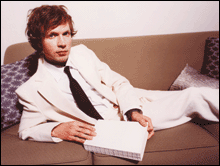Reworking Beck, Bloc Party, and more
By DAVID DAY | February 2, 2006
 For decades now, remixes have been a tool to get pop songs into dance clubs. By plugging in a bigger beat, repeating a phrase or two, and adding echoey effects and dramatic intros, remixes can turn even the simplest pop ditty into a dance-floor epic. The technique began as part of the studio culture of Jamaica, home of the dub, and spread rapidly, helping to ignite the disco craze and adding a marketable edge to post-punk England and America. (Dance remixes of early tracks by U2, for example, were a common commodity.) But it was when hip-hop and urban R&B reached their apex that the remix — or multiple remixes — became an integral part of the mainstream pop lexicon. Remixing remains an art, but the remix itself has evolved into a powerful commercial tool. By hyping an already hyped artist, the right remix can be a ticket to multi-platinum millions.
For decades now, remixes have been a tool to get pop songs into dance clubs. By plugging in a bigger beat, repeating a phrase or two, and adding echoey effects and dramatic intros, remixes can turn even the simplest pop ditty into a dance-floor epic. The technique began as part of the studio culture of Jamaica, home of the dub, and spread rapidly, helping to ignite the disco craze and adding a marketable edge to post-punk England and America. (Dance remixes of early tracks by U2, for example, were a common commodity.) But it was when hip-hop and urban R&B reached their apex that the remix — or multiple remixes — became an integral part of the mainstream pop lexicon. Remixing remains an art, but the remix itself has evolved into a powerful commercial tool. By hyping an already hyped artist, the right remix can be a ticket to multi-platinum millions.
The current wave of remixing really began when Jennifer Lopez’s third album, 2002’s J. to tha L-O! (Sony), became the first full-length album of remixes to top the pop charts. The blueprint was set: a label could take tracks that had already been recorded and paid for, hire a team of the hottest producers to work their magic, and repackage already familiar material as a “new” album for the fraction of the cost of having the artist record an album of actual new material. Jazz labels like Verve and Impulse caught wind of the concept and raided their vaults; they’ve been releasing remix CD after remix CD for the last few years. (Verve is already up to Volume 3 of its remix series and has compiled them all in a box set.) And certain artists have naturally gravitated toward remixes: dance divas from Madonna to Britney Spears target club DJs with special remixes of their hits, and singer-songwriters like Sarah McLachlan straddle the radio/club divide by offering beefed-up dance versions of selected tracks to clubland. Simply compiling Spears or McLachlan remixes on a full-length collection for mass consumption is a no-brainer. And since those remixes are officially licensed by the record company to begin with, there are rarely any legal hurdles.
 Related
Related:
Who’s that girl (now)?, Review: Britney Spears at the Garden, The 100 unsexiest men 2007: 50-41, More 
- Who’s that girl (now)?
I’d wager that Madonna is not much of a fun person.
- Review: Britney Spears at the Garden
"Oh my God, this is going to be so fucking crazy!" screams a teenage girl behind me.
- The 100 unsexiest men 2007: 50-41
These guys couldn't turn on a radio
- Indie springs forward
For years we waited. And then we started making jokes about it. And then the jokes got old. So we waited some more. Clap Your Hands Say Yeah, "Love Song No. 7" (mp3)
- The Bladerunners
Freestyle music is an overlooked chapter of dance music. The Bladerunners, "Work It, Shake It (remix edit)" (mp3)
- Primadonna
This article originally appeared in the July 29, 1986 issue of the Boston Phoenix .
- Natalie Walker
It’s all soothing, but Walker’s never too sweet.
- Britney Spears
Spears’s fifth studio album is a witchy electro-pop wonder as suspect as those prescription pills photographed in her purse a few weeks ago.
- Kundalini conjuror
Lines upon reading that Britney Spears may recently have spent the night with the heavy-metal illusionist Criss “Mindfreak” Angel
- Recapturing the magic
Watch a slideshow of the Police at Fenway Park.
- Police force
Along came the Police, packing cold, steely hits with flashes of heat.
- Less

 Topics
Topics:
Music Features
, Madonna (Entertainer), Sarah McLachlan, Thievery Corporation, More  , Madonna (Entertainer), Sarah McLachlan, Thievery Corporation, NHL Western Conference, Bloc Party, NHL Northwest Division, Erol Alkan, Vancouver Canucks, Kool & The Gang, Paul Epworth, Less
, Madonna (Entertainer), Sarah McLachlan, Thievery Corporation, NHL Western Conference, Bloc Party, NHL Northwest Division, Erol Alkan, Vancouver Canucks, Kool & The Gang, Paul Epworth, Less 